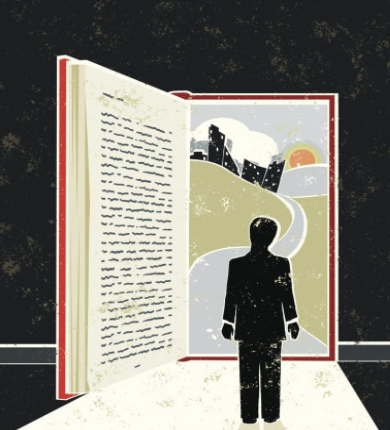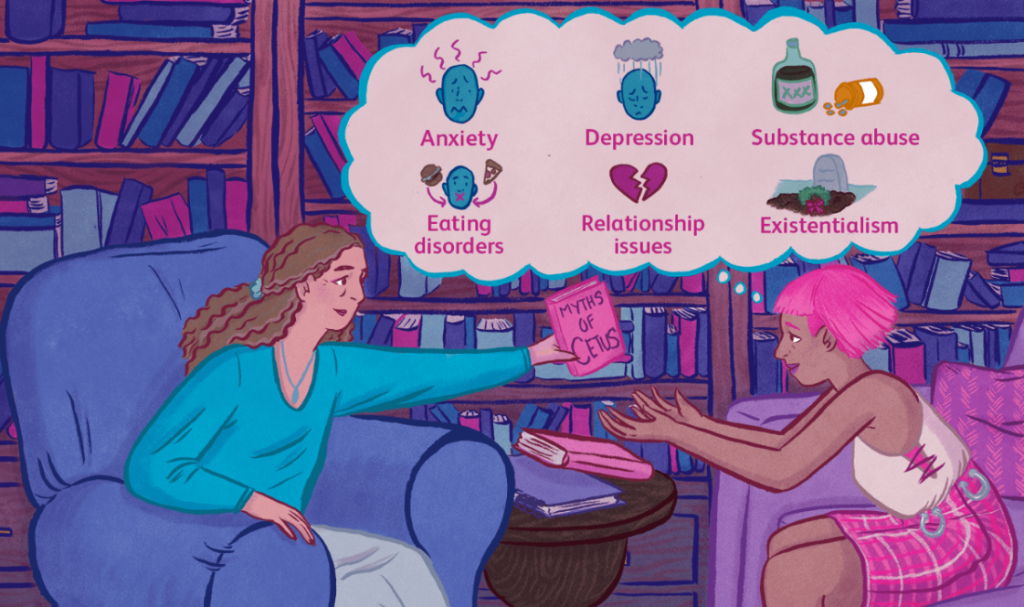Bibliotherapy is a creative technique or self-help therapy that aims to stabilize individuals’ emotional and mental well-being, promoting mood enhancement and alleviating depression. It can be beneficial for various groups, including children, disabled individuals, pregnant women, and those affected by social crises, career anxiety, trauma, childhood abuse, and PTSD. The term “bibliotherapy” derives from “Biblio” (books) and “therapy” (treatment), signifying the use of books or texts as a therapeutic tool. Typically, bibliotherapy involves the meditative interpretation of literature, storytelling, plays, poetry, and other healthy practices recommended by therapists or psychotherapists to address specific concerns of clients or patients.
Classifications Of Bibliotherapy
Bibliotherapy is a method of reading that can be considered both typical and atypical, as it effectively helps modify the behaviour patterns of individuals by fostering the development of essential social skills. Its primary purpose is to assist patients in coping with difficult emotions or traumas such as feelings of meaninglessness, breakups, loneliness, ageism, racism, sexism, eating disorders, helplessness, and other negative experiences that can lead to depression. There are four main types of bibliotherapy based on clinical and educational systems.
Creative Bibliotherapy
In a group setting, bibliotherapy utilizes innovative techniques involving literature and reading graphic novels to foster positive mental health in patients. Formal bibliotherapy provides support akin to having a friend sitting alongside the individual, while informal bibliotherapy follows regular and punctual suggested practices recommended by highly skilled therapists.
Development Bibliotherapy
Development bibliotherapy gives an idea about the issues an individual encounters in his or her adolescent period like puberty and many other changes in physical and mental health with time. In this type of therapy, patients develop social, emotional and intellectual understanding and gain deep insight into well-being.
Prescriptive Bibliotherapy
Prescriptive Bibliotherapy is defined as a combination of more than one therapy for client counselling sessions. It helps to connect an individual or client with his or her mental situation or can say these strategies help the patient to face himself or herself, thanks to prescribed text or graphic books and literature.
Therapeutic bibliography
Bibliotherapy along with one or more types of therapy or a combination of therapy such as CBT (cognitive behavioural therapy) or behavioural therapy helps the therapist to guide which in turn helps the patient to deal with psychological issues leading to a positive and long-lasting impact. Such therapy focuses on a self-learning, intellectual understanding and emotional and social skills resulting in the deprivation of depression state of mind of an individual no matter at what stage the anxiety of depression is.
Bibliotherapy Treatment Tracks: Techniques And Strategies

Mainly three strategies are implemented in considering affecting an individual getting out of worst experiences. Three Techniques such as graphic treatment give way to the other two techniques and these are effective treatment and cognitive treatment.
These help patients to find themselves out of the main character of the story books and feel an emotional connection with the character and with its harsh and empathic situation too. These interconnected treatments of Bibliotherapy help to light a match of hope and meaningfulness altogether and the client starts up adding votes, empathises for his or her life and takes herself and himself as a friend.
Cognitive Behavioral Treatment (CBT)
CBT treatment is not less than a self-help technique in which the client mainly gets an idea of the program and content of the whole therapy instead of getting much introduced to the therapist. The content of these books is based on issues encountered during the maturity period and provides healthy guidance for children. Considering bibliotherapy in this technique, an individual is provided with recommended content for reading and writing and is supposed to meditate and read the literature for the well-being of his or her mental state to get rid of all negative thoughts.
Affective Treatment
Affective treatment or precise methodology focuses on fiction whereas CBT is a self-help technique. Affective treatment is used to deal with affective disorders such as emotional breakdown, depression, loss of empathy and self-confidence, aggressive reaction to even mild conditions, unexpected and unusual introverted nature and many health issues. Bibliotherapy along with effective treatment promises a change in the lookout of a client towards the unwell circumstances with the support of the individual agreed for gaining insight and finding the problem to bring change in his or her social and emotional behaviour.
Graphic Or Visual Treatment
It was the 1940s when comic books consisting of graphics novels came into the picture and were used in the visual treatment of patients undergoing mental health suffering and are termed ‘Public Health Graphics’. Not only offline but also this graphic content is made available online through some professionals on graphics and medical treatment websites. Reading graphic or visual treatment helps individuals to get a command of literature, helps to meditate, and is a good way for exercising hands and eyes, and helps in getting out of mental disability. This treatment along with Bibliotherapy helps individuals in explaining his or her struggles without any fear and get a chance to socialise.
What Bibliotherapy Facilitates With?

Bibliotherapy and healing activities are not only reading therapy but also implementing writing as good practice to enhance intellectual and emotional skills. This helps clients in getting rid of stress and grief and leaves the patient with hope and empathy. It facilitates individuals suffering from stress, anxiety, depression, loneliness, the grief of a loved one’s death, society rejection based on any gap, family issues, disability, helplessness, eating disorder, shame for physical appearance, guilt for unknown reasons and many other adolescent and ageism factors.
Bibliotherapy counselling or consumption sessions in conjunction with other numerous forms of therapy help in gaining rational perspective and deep insight into individual nationalisation (anxiety and depression), social (self-centred, shyness and attitudes issues) and externalised (anger issues) behaviour.
-ASHU RANI
Must read: DISCRIMINATION OF ELITE SPACES


